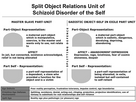Encore une présentation de qualité sur les schizoïdes, expliquant que c'est plus qu'une simple asociabilité poussée à l'extrême, il y a mention du masque/du faux-soi pour les situations externes, de mise à distance horizontale plutôt que verticale 
"Schizoid" Not to be confused with Schizophrenia or Schizotypal personality disorder.
Schizoid personality disorder (SPD) is a personality disorder characterized by a lack of interest in social relationships, a tendency towards a solitary lifestyle, secretiveness, and emotional coldness. There is increased prevalence of the disorder in families with schizophrenia. SPD is not the same as schizophrenia, although they share some similar characteristics such as detachment or blunted affect.
"Patients with schizoid personality disorders consider themselves to be observers, rather than participants, in the world around them."
studies on the schizoid personality have developed along two separate paths:
1,overtly observable, behavioral, and describable symptoms
2.exploration of covert or unconscious motivation and character structure
the majority of schizoids are not either oversensitive or cold, but they are oversensitive and cold “at the same time” in quite different relative proportions, with a tendency to move along these dimensions from one behavior to the other
The World Health Organization's list schizoid personality disorder as beginning by early adulthood (age eighteen or older) and present in a variety of contexts
1) Emotional coldness, detachment or reduced affection.
2) Limited capacity to express either positive or negative emotions towards others.
3) Consistent preference for solitary activities.
4) Very few, if any, close friends or relationships, and a lack of desire for such.
5) Indifference to either praise or criticism.
6) Taking pleasure in few, if any, activities.
7) Indifference to social norms and conventions.
8) Preoccupation with fantasy and introspection.
9) Lack of desire for sexual experiences with another person
- a schizoid may also be attracted to exploitive relationships, where they long to experience significance and recognition by serving a need of the other. Yet this same person may be highly aware of any forms of corruption or exploitation outside of this relationship.
Many fundamentally schizoid people present with an engaging, interactive personality style. Such a person can appear to be available, interested, engaged, and involved in interacting with others; however, in reality, he or she is emotionally withdrawn and sequestered in a safe place in an internal world.
- Several points are important to review at this time. First, what meets the objective eye may not be what is present in the subjective, internal world of the patient. Second, one should not mistake introversion for indifference. Third, one should not miss identifying the schizoid patient because one cannot see the forest of the patient’s withdrawnness through the trees of the patient’s defensive, compensatory, engaging interaction with external reality.
The need for attachment as a primary motivational force is as strong in the schizoid person as in any other human being. However, because the schizoid's love objects are internal, he or she finds safety without connecting and attaching to objects in the real world
- The more that schizoids can rely on themselves, the less they have to rely on other people and expose themselves to the potential dangers and anxieties associated with that reliance or, even worse, dependence. The vast majority of schizoid individuals show an enormous capacity for self-sufficiency, for the ability to operate alone, independently and autonomously, in managing their worlds
The sense of superiority of the schizoid has nothing to do with the grandiose self of the narcissistic disorder. It does not find expression in the schizoid through the need to devalue or annihilate others who are perceived as offending, criticizing, shaming, or humiliating. This type of superiority was described by a young schizoid man:
"If I am superior to others, if I am above others, then I do not need others. When I say that I am above others, it does not mean that I feel better than them, it means that I am at a distance from them, a safe distance."
It is a feeling of being horizontally, rather than vertically distant
- Because of the tremendous investment made in the self ( the need to be self-contained, self-sufficient, and self-reliant ) there is inevitable interference in the desire and ability to feel another person’s experience, to be empathic and sensitive. Often these things seem secondary, a luxury that has to await securing one's own defensive, safe position. The subjective experience is one of loss of affect. For some patients, the loss of affect is present to such a degree that the insensitivity becomes manifest in the extreme as cynicism, callousness, or even cruelty. The patient appears to have no awareness of how his or her comments or actions affect and hurt other people. More frequently, the loss of affect is manifest within the patient as genuine confusion, a sense of something missing in his or her emotional life.
Loneliness: It reveals itself in the intense longing for friendship and love which repeatedly break through. Loneliness in the midst of a crowd is the experience of the schizoid cut off from affective rapport."
This is a central experience of the schizoid that is often lost to the observer. Contrary to the familiar caricature of the schizoid as uncaring and cold, the vast majority of schizoid persons who become patients express at some point in their treatment their longing for friendship and love. Such longing, however, may not break through except in the schizoid’s fantasy life.
There is a very narrow range of schizoid individuals ( the classic DSM-defined schizoid ) for whom the hope of relationship is so minimal as to be almost extinct;
Depersonalization is a dissociative defense. Depersonalization is often described by the schizoid patient as a tuning out or a turning off, or as the experience of a separation between the observing and the participating ego. It is experienced by those with schizoid personality disorder when anxieties seem overwhelming. It is a more extreme form of loss of affect than that described earlier. Whereas the loss of affect is a more chronic state in schizoid personality disorder, depersonalization is an acute defense against more immediate experiences of overwhelming anxiety or danger
One person with SPD commented that he could not fully enjoy the life he has because he felt that he is living in a shell. Furthermore, he noted that his inability distressed his wife.
- people with SPD “feel lost” without the people they are normally around because they need a sense of security and stability. However, when the patient’s personal space is violated, they feel suffocated and feel the need to free themselves and be independent. Those people who have SPD are happiest when they are in a relationship in which the partner places few emotional or intimate demands on them, as it is not people as such that they want to avoid, but both negative and positive emotions, emotional intimacy, and self disclosure.
Because of their lack of communication with other people, those who are diagnosed with SPD are not able to have a reflection of themselves and how well they get along with others. The reflection is important so they can be more aware of themselves and their own actions in social surroundings. Laing suggests that without being enriched by injections of interpersonal reality there occurs an impoverishment in which one's self-image becomes more and more empty and volatilized, leading the individual himself to feel unreal.
- Under stress, some people with schizoid personality features may occasionally experience instances of brief pyschosis (loss of contact with reality) Fantasy is also relationship with the world and with others by proxy.
It is a substitute relationship, but a relationship nonetheless, characterized by idealized, defensive, and compensatory mechanisms. It is an expression of the self-in-exile because it is self-contained and free from the dangers and anxieties associated with emotional connection to real persons and situations.
Fantasy permits schizoid patients to feel connected, and yet still free from the imprisonment in relationships. In short, in fantasy one can be attached (to internal objects) and still be free.
- suicide may also be a running theme for schizoid individuals, though they are not likely to actually attempt one. They might be down and depressed when all possible connections have been cut off, but as long as there is some relationship or even hope for one the risk will be low.
The idea of suicide is a driving force against the person's schizoid defenses. As Klein says: "For some schizoid patients, its presence is like a faint, barely discernible background noise, and rarely reaches a level that breaks into consciousness.
For others, it is an ominous presence, an emotional sword of Damocles. In any case, it is an underlying dread that they all experience.
SPD is rare compared with other personality disorders. Its prevalence is estimated at less than 1% of the general population. but there is a discrepincy as people with this disorder are not likely to seek treatment.
- Ultimately, remembering with feeling leads the patient to the understanding that he or she had no choice in the process of developing a schizoid stance toward others. The patient did not have the opportunity to choose from a selection of possible ways of experiencing the self and of relating with others, rather, the patient had few if any options. The false self was simply the best way in which the patient could experience repetitive predictable acknowledgment, affirmation, and approval (the emotional supplies necessary for emotional survival), while warding off the effects associated with the abandonment depression.


